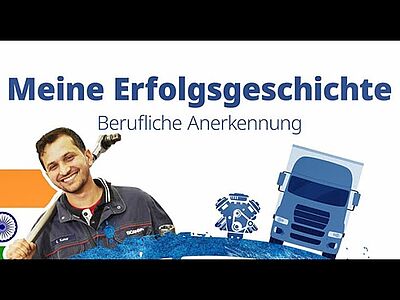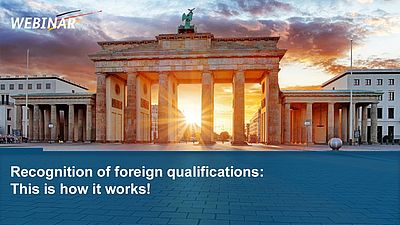
Who needs recognition?
Do I need recognition? Depending on your country of origin, profession and desired residence title, the recognition of your foreign qualification may be necessary. Find more detailed information below.
Regulated professions
You can only work in regulated professions in Germany if you have a very specific qualification. This, for example, applies to many professions in the fields of health care, legal advice, and teaching in state schools. There are also regulations for certain master craftworkers who run a business. In engineering professions, there is a regulation if the professional title of “engineer” is required for the occupation. To find out whether your profession is regulated in Germany, please use the Recognition Finder of “Anerkennung in Deutschland (External link) ”.
If you wish to work in one of these regulated professions in full capacity, your will generally require the recognition of your foreign qualification, regardless of your country of origin. For non-EU nationals, the full recognition is also a requirement for certain residence titles, such as the visa for qualified professionals or for most cases of the EU Blue Card. Moreover, no points must be scored for the opportunity card if the full recognition has been acquired.
The recognition occurs in the framework of a so-called recognition procedure; you will find detailed information on this in our “Recognition procedure" section. In regulated professions, a licence to practise is generally required as well, aside from the recognition of professional qualifications.
Non-regulated professions
Most professions in Germany are non-regulated. This means that you do not require formal recognition of your foreign qualification to practise the profession in Germany. For example, to be allowed to work as a hotel manageress or hotel manager, a formal recognition of your foreign qualification is not required.
If you are from a non-EU country, you may, however, need the recognition of your foreign professional qualification for a work visa in Germany in certain cases. In this context, a distinction between non-academic professional qualification and academic qualification is not made.
Non-regulated professions: non-academic professional qualifications
If you have completed non-academic vocational training abroad, the recognition of the foreign qualification is a requirement for certain visas, such as the work visa for qualified professionals. In addition, points for the opportunity card do not have to be scored, if you have the full recognition. Please find detailed information in the “Recognition procedure" section.
Non-regulated professions: academic degrees
For academic degrees that do not lead to a regulated profession, such as biologist, physicist or linguist, there is no formal recognition procedure like in regulated professions or non-academic professional qualifications.
Depending on what work visa comes into consideration, non-EU-country nationals with such academic degrees must provide one of the following proofs:
- The foreign academic degree must be comparable with a German academic degree: this is valid for the work visa for qualified professionals, the EU Blue Card and the opportunity card: “skilled worker” option.
- The foreign academic degree must be state-recognized in the county where it was obtained: this is valid for the visa for professionally experienced workers and the opportunity card: “points system” option.
For both types of proof, a printout of the positive result in the anabin database or a Statement of Comparability for Foreign University Degrees is sufficient.
You can find detailed information on this in the “Evaluation of foreign academic degrees” section.
No recognition required for these visa options
Regardless of whether your profession is regulated or non-regulated, the recognition is not required, if you wish to apply for certain visas: the visa for a recognition partnership, the visa for professionally experienced workers or the opportunity card: “points system” option. For this visa, you only require a Statement on a Foreign Vocational Qualification (DAB) or a Statement of Comparability for foreign academic degrees, if applicable. Please find detailed information on this in the “State recognition in the country of training” section.
Information on the web
- Federal Office for Migration and Refugees Hotline on “Recognition of foreign non-academic vocational qualifications”
- Recognition of qualifications in Germany How to have your non-academic vocational qualifications recognised and where to find your local contact centre
- Federal Employment Agency Search for regulated professions in Germany
- IHK FOSA (Foreign Skills Approval) National Centre of Excellence for the recognition and assessment of foreign non-academic vocational qualifications
- BQ Portal Information on foreign non-academic vocational qualifications and on foreign basic and advanced vocational training courses
- IQ Network Find an advice centre near you to have your international qualification recognized
- ProRecognition Advisory on the recognition of foreign qualifications
Do you have any questions?
Let us advise you on your opportunities to work and live in Germany. Our experts will support you with questions regarding job search, visa, recognition and learning German.
You can find out more about the various contact options by clicking on one of the icons in the bar below.




